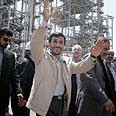
Ahmadinejad at nuclear reactor
צילום: איי אף פי
No reason to celebrate
Latest US report on Iran paints picture that is anything but reassuring
When one examines the key judgments included in the National Intelligence Estimate (NIE) on Iran released earlier this week, the picture is anything but reassuring.
First of all, there is the assessment "with high confidence" that Iran halted its nuclear weapons program in fall 2003. While many have tended to view this as the good news, in fact, the assessment indirectly provides confirmation that this nuclear weapons program did exist up until that time – in other words, until 2003 Iran was working under government direction to develop nuclear weapons.
The 2005 Estimate – that many in the past few days have referred to as the more severe assessment of the two – was actually much less confident on this point.
According to media reports at the time, the 2005 Estimate included credible indicators only that Iran's military was conducting clandestine work, but no information linking those projects directly to a nuclear weapons program. The assessment at that time, and the common assessment since, was that Iran was working on the development and acquisition of technologies that could be diverted to military applications. And this is still the case according to the 2007 NIE.
In fact, it states, with "moderate confidence," that Iran probably would be capable of producing enough highly enriched uranium for a weapon during the 2010-2015 time frame. Moreover, according to the report, the halt lasted "at least" several years, and there is only "moderate confidence" that Iran has not restarted the program as of mid-2007.
But most important, the program can be restarted at any time – it's a question of making a decision; according to the report, we "do not know whether (Iran) currently intends to develop nuclear weapons". So much for the good news.
The estimate goes on to say that the freezing of the weapons program in 2003 is indication that Iran is susceptible to international pressure; indeed, that it makes cost-benefit analyses. But of course the sanctions route pursued over the last year is based on that very same assessment: the only rationale for sanctions is that Iran may alter its behavior in light of economic hardship. So there is nothing revolutionary here.
Blatant Iranian defiance
If we take the cost-benefit logic one step further, we can only conclude that letting up on pressure is likely to convince Iran to restart its program. After all, there is nothing in the estimate to suggest that Teheran’s basic motivation to develop nuclear weapons has been altered. It is merely responding to immediate short-term pressure.
The situation would be very different if we were talking about a deal with Iran. But we're not. Unfortunately there is nothing in Iran's behavior to suggest that it is any closer to seriously considering a deal now than in the past 5 years.
Indeed, Iran is defying the international community in the most blatant manner, pushing its uranium enrichment activity forward in direct defiance of three Security Council resolutions; Javier Solana's attempts to negotiate with Iran over the past six months have led nowhere.
The logic of sanctions is to pressure Iran to the point that it will finally come to the negotiating table actually looking for a deal. The benefit of such a deal is that it would be comprehensive, and that Iran would have a long-term interest in upholding it.
Finally, there are additional aspects of Iran's behavior – that go to its most basic motivations in the regional sphere – where we also see no change; namely, Iran's attempts to enhance its regional standing, increase its influence and base its hegemony in the Middle East.
While all eyes were focused on the new NIE, Iran's president Ahmadinejad took part in the Gulf Cooperation Council’s annual summit – the first time an Iranian president has done so – with offers of security cooperation to the Arab Gulf states. And this is just the latest in a long string of activities that Iran is conducting in this vein.
Iran is working very hard to enhance its regional standing through coalition-building efforts. Most significantly, Ahmadinejad's attendance at the summit came on the heels of attempts over the past weeks to improve bilateral security relations with Qatar, Oman and Kuwait.
Nuclear weapons capabilities in the hands of Iran – and even strong suspicions of such capabilities – would significantly enhance Iran's ability to carry out its regional designs. This is where the real danger lies – for all states in the Middle East.
Emily B. Landau is Director, Arms Control and Regional Security Project, Institute for National Security Studies (INSS). She is also the Author of Arms Control in the Middle East: Cooperative Security Dialogue and Regional Constraints (Sussex Academic Press, 2006)










